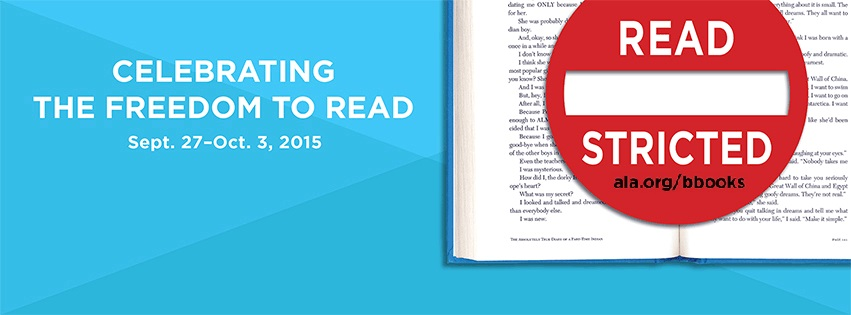 If you've followed this site in the past few years, you already know the deal here.
If you've followed this site in the past few years, you already know the deal here.
Banned Books Week 2015 officially started on my birthday, 27 September, and runs through 3 October. It is a celebration of the freedom to read, with a focus on texts that have been challenged, censored, or banned around the world.
Banned Books Week has its own central hub with tons of great information. The American Library Association and Comic Book Legal Defense Fund also do a lot of heavy lifting for the most literary celebration of the year.
Last year, 311 challenges were reported to the Office of Intellectual Freedom. I know many more go unreported each year. I'm friends with too many librarians and teachers to not hear stories of furious parents demanding x, y, or z be removed from the shelves or curriculum because of a dirty word or unsavory thought. Shoot, I'm still friends with someone that had to challenge The Absolute True Diary of a Part-Time Indian by Sherman Alexie, not because the content itself was offensive, but because students began bullying her daughter with the racial slurs they picked up from the novel. And even then, she didn't mean for the book to be censored or pulled from the curriculum; the school did that on their own.
Speaking of Sherman Alexie's excellent novel, The Absolute True Diary of a Part-Time Indian tops the 2014 list of most challenged books. It's joined by newcomers It's Perfectly Normal by Robie Harris, Saga by Brian Vaughn and Fiona Staples, A Stolen Life by Jaycee Dugard, and Drama by Raina Telgemeier.
Here's the full list with the reasons behind the challenges:
1) The Absolutely True Diary of a Part-Time Indian, by Sherman Alexie
Reasons: anti-family, cultural insensitivity, drugs/alcohol/smoking, gambling, offensive language, sex education, sexually explicit, unsuited for age group, violence. Additional reasons: “depictions of bullying”
2) Persepolis, by Marjane Satrapi
Reasons: gambling, offensive language, political viewpoint. Additional reasons: “politically, racially, and socially offensive,” “graphic depictions”
3) And Tango Makes Three, Justin Richardson and Peter Parnell
Reasons: Anti-family, homosexuality, political viewpoint, religious viewpoint, unsuited for age group. Additional reasons: “promotes the homosexual agenda”
4) The Bluest Eye, by Toni Morrison
Reasons: Sexually explicit, unsuited for age group. Additional reasons: “contains controversial issues”
5) It’s Perfectly Normal, by Robie Harris
Reasons: Nudity, sex education, sexually explicit, unsuited to age group. Additional reasons: “alleges it child pornography”
6) Saga, by Brian Vaughan and Fiona Staples
Reasons: Anti-Family, nudity, offensive language, sexually explicit, and unsuited for age group. Additional reasons:
7) The Kite Runner, by Khaled Hosseini
Reasons: Offensive language, unsuited to age group, violence
8) The Perks of Being a Wallflower, by Stephen Chbosky
Reasons: drugs/alcohol/smoking, homosexuality, offensive language, sexually explicit, unsuited for age group. Additional reasons: “date rape and masturbation”
9) A Stolen Life, Jaycee Dugard
Reasons: drugs/alcohol/smoking, offensive language, sexually explicit, and unsuited for age group
10) Drama, by Raina Telgemeier
Reasons: sexually explicit
For the record, Captain Underpants went from topping the list to not factoring in the Top 10, and The Bluest Eye by Toni Morrison has been steadily climbing in recent years.
Also for the record, challenging memoirs like Persepolis and A Stolen Life for offensive language and content is absurd. The reason to engage with those texts in a classroom is to actually challenge students with diverse narratives about people their own age in challenging situations. Might as well toss in The Diary of Anne Frank and I Know Why the Caged Bird Sings and remove personal memoir from curricula all together. No, I'm not actually advocating for that.
We need to celebrate books that challenge and thrill the mind. Students need to read a diverse range of books in genre, viewpoint, theme, and style so that they can become well-rounded adults. The kind of bland and inoffensive text parents complaining about homosexuality, masturbation, and violence would approve of are still taught; they just need to be taught in the context of a broader literary canon filled with texts that students better engage with.
Celebrate Banned Books Week by reading one of the frequently challenged books, either by year or historically. Why, there's still enough time to read James Joyce's Ulysses, a book that had to be unbanned in America by the Supreme Court. Or, you know, go to Comixology and catch up with Saga. It's so good.